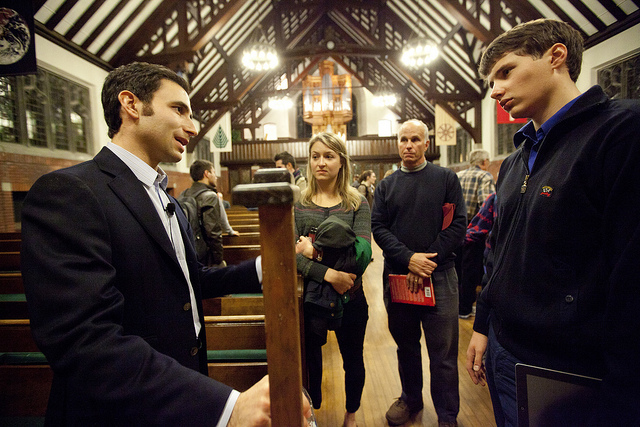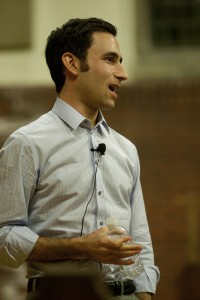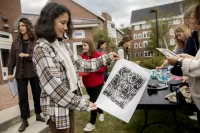
Trade screen time for inner view, Belsky urges

Andrews lecturer Scott Belsky, left, speaks with audience members after his talk, including, Alexey Bobko '13, of Minsk, Belarus.
There are tragedies, and then there are tragedies.
Earthquake, tsunami and uncontained nuclear radiation in Japan.
Tornadoes ravaging the American heartland.
Losing your iPhone — wait, what?
Yes, this too is a tragedy. Or so said 41 percent of Stanford University students polled in a 2010 survey on smartphone use.
That statistic came out during a Nov. 8 address by Scott Belsky, an expert on technology and creative work who helped Bates kick off a campus-wide experiment in going unplugged.
With our time and consciousness increasingly ruled by electronic media, the Nov. 8-15 initiative Present Tense: Being Here and Now in a Nonstop World encourages a break from the little screen and a re-engagement with the spiritual self.
Belsky, in the college’s annual Bertha May Bell Andrews Lecture, described the psychic toll taken by constant connectivity — and offered a few suggestions for reclaiming inner peace.

Scott Belsky discusses the importance of reflective thought amidst the information onslaught in the annual Andrews Lecture on Nov. 8.
Multifaith Chaplain Bill Blaine-Wallace welcomed about 100 people to the Bates Chapel for the event. Among them were Cindy Andrews ’74 and Kristy Andrews ’12, members of a family whose long Bates lineage includes Dr. Carl Andrews ’40, who established the Andrews Lecture to honor his mother in 1975.
Belsky is the author of the national best-seller Making Ideas Happen, and is founder and CEO of Behance, a company that develops products and services for the creative industries. As someone whose work straddles the realms of high-tech and inner inspiration, he also has, he admitted, his own struggles with the tempting distractions of constant connectivity.
Belsky based his talk on the concept of “sacred space” — the conditions that are conducive to deep and reflective thought. Without such contemplation, he said, it’s difficult to bring good ideas to fruition, and easy to lose sight of what’s most important to us.
“We’re obsessed with the present tense,” he said, alluding to the Bates initiative. “We want real-time information. The past tense is old news, the future is dreaming, but the present tense is real.”
Constant connectivity “threatens both your quality of life and your ability to make an impact on what matters most to you,” Belsky said. We cease to be present in our own lives. Instead, we’re “just hacking away at the collective inboxes all around us, just trying to stay afloat.
“In some ways we are living someone else’s to-do list.”
He said, “In our professional lives, I call this the era of reactionary workflow. In our personal lives, it’s reactionary living. . . .With endless streams of information always flowing in, we have become increasingly reactive . . . rather than being proactive with what matters most to us.”
One of Belsky’s most compelling concepts was “insecurity work” — the compulsive checking of e-mail, feeds, texts, tweets, posts and other e-stimuli in a futile effort to assure ourselves, as he put it, that everything is OK.
“We want to know that our family and friends are there for us,” that our jobs still need us, that our stocks haven’t tanked and the world hasn’t ended while we were checking Facebook.
But through this constant vigilance, he said, “we are losing interest in ourselves,” he said.
At the same time, we’re increasingly ignoring life’s serendipitous gifts of surprise, accident and coincidence. “As we become more connected and wedded to our devices, we become less open to circumstance. Quite simply, we stop noticing what’s going on around us.”
Belsky noted that he met his wife because of a chance meeting between their mothers, strangers until then, who chatted in a nail salon while their nails dried. “I have to wonder,” he said, “if these two women had had their smartphones and their iPads, would they have even started talking?”
“I encourage you to value the circumstantial, recognize how powerful it is and then mine the circumstantial more intentionally.”
Belsky’s key prescription for his audience was to build into the daily routine opportunities for deep thinking and for focus on true priorities. “Create windows of non-stimulation during your day and life, whether they are habits or rituals or both.”
In that spirit, a group of Jewish artists launched a project called the Sabbath Manifesto, through which they (as their website explains) have “adapted our ancestors’ rituals by carving out one day per week to unwind, unplug, relax, reflect, get outdoors and get with loved ones.”
In 2010 the group declared a National Day of Unplugging, and issued an Unplug Challenge, wherein celebrities disconnected themselves from the e-hive mind for 24 hours. Participants included actor Josh Radnor.
“The 21st century challenge is to keep your focus, and preserve the sanctity of mind that is required to create, and ultimately make an impact on what matters most. Imagination happens when your mind has the freedom to run rampant,” Belsky said.
Belsky also advised his listeners to “recognize the insecurity work that you do and compartmentalize it”; and to learn to rely on their own mental resources. “Nothing should resonate more than your own intuition.”
“It’s all really difficult to do,” he concluded. “But we’re all part of the future, so we really need to figure this out.”
In the years to come, he said, “I believe that focus and the ability to be present will be the greatest competitive advantage for success professionally, and certainly personally.”




